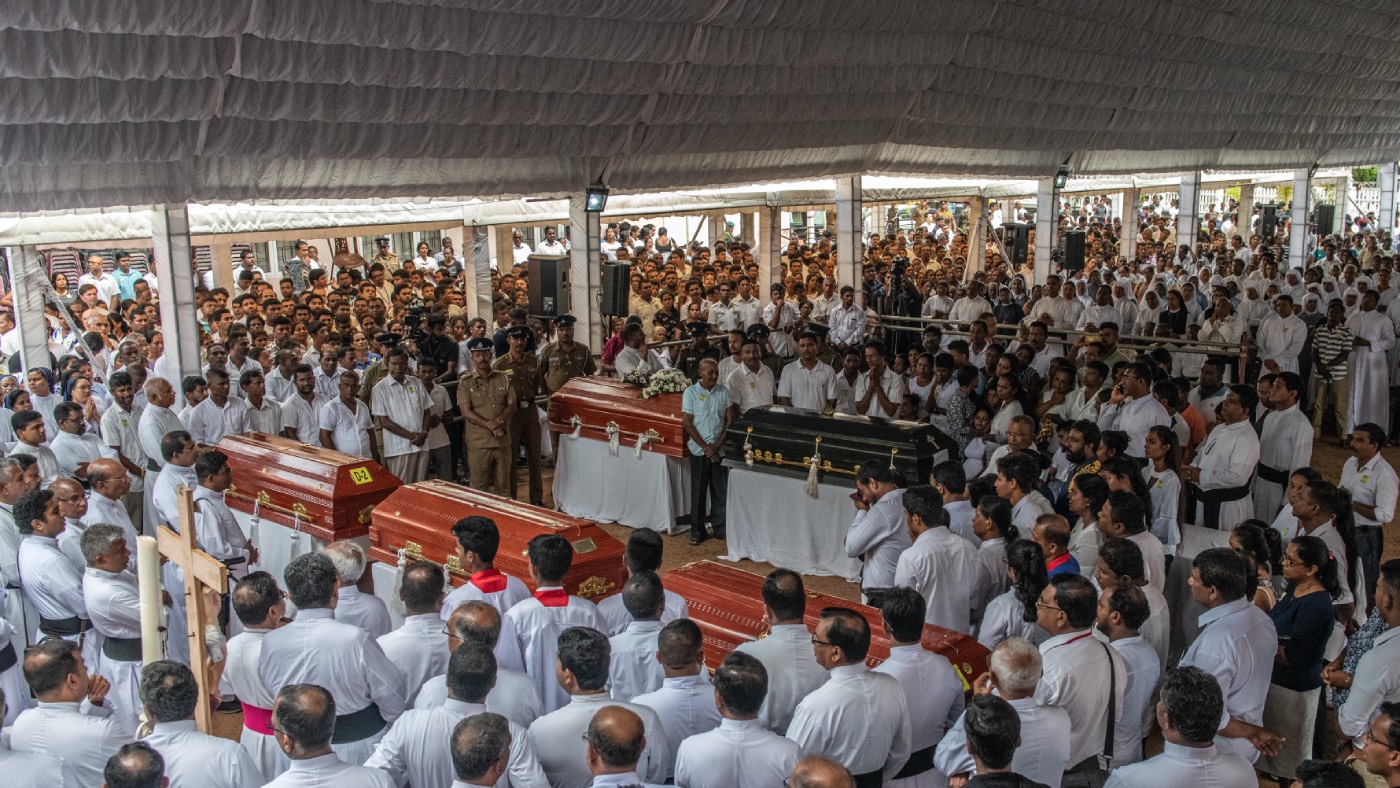Sri Lanka attacks: Islamic State claims responsibility
Terror group claim comes as authorities face anger over failure to act on warnings

A free daily email with the biggest news stories of the day – and the best features from TheWeek.com
You are now subscribed
Your newsletter sign-up was successful
Islamic State has claimed responsibility for the Easter bombings in Sri Lanka that killed 359 people and wounded about 500.
The group’s Amaq news agency released a statement saying its “fighters” were responsible for the attack and also listed the names of the suicide bombers, who were shown in a video swearing allegiance to IS.
The terror group said that it had “targeted nationals of the crusader alliance [the anti-IS coalition led by the US] and Christians in Sri Lanka”.
The Week
Escape your echo chamber. Get the facts behind the news, plus analysis from multiple perspectives.

Sign up for The Week's Free Newsletters
From our morning news briefing to a weekly Good News Newsletter, get the best of The Week delivered directly to your inbox.
From our morning news briefing to a weekly Good News Newsletter, get the best of The Week delivered directly to your inbox.
Although IS has made false claims of responsibility in the past, experts say the attacks on three churches and luxury hotels bear the hallmarks of the group.
If the official investigation into the bombings confirms IS involvement, The Guardian says it would “suggest [IS] retains the ability to launch devastating strikes around the world despite multiple defeats in the Middle East”.
In addition, The Times's Richard Spencer suggests the attack “may mark definitively” the divorce between “al-Qaeda, with a calculated ideology and clearly defined ‘centre’", and IS, “an essentially opportunistic and nihilistic movement... to which anyone who wishes to indulge in violence can subscribe”.
The news comes as Sri Lankan authorities face criticism over reports that they had received repeated warnings from Indian intelligence services about a potential suicide attack against churches.
A free daily email with the biggest news stories of the day – and the best features from TheWeek.com
A Sri Lankan defence official told Reuters that a warning was sent by Indian officials on Saturday night, and a source in the Indian government source said two similar messages had been given to Sri Lankan intelligence agents, on 4 April and 20 April.
However, Sri Lanka's president, Maithripala Sirisena, insisted reports of threats had not been shared with him and vowed to overhaul state security.
In a televised address, he announced changes to the heads of defence forces “within 24 hours”, saying: “The security officials who got the intelligence report from a foreign nation did not share it with me. I have decided to take stern action against these officials.”
-
 What are the best investments for beginners?
What are the best investments for beginners?The Explainer Stocks and ETFs and bonds, oh my
-
 What to know before filing your own taxes for the first time
What to know before filing your own taxes for the first timethe explainer Tackle this financial milestone with confidence
-
 The biggest box office flops of the 21st century
The biggest box office flops of the 21st centuryin depth Unnecessary remakes and turgid, expensive CGI-fests highlight this list of these most notorious box-office losers
-
 Epstein files topple law CEO, roil UK government
Epstein files topple law CEO, roil UK governmentSpeed Read Peter Mandelson, Britain’s former ambassador to the US, is caught up in the scandal
-
 Iran and US prepare to meet after skirmishes
Iran and US prepare to meet after skirmishesSpeed Read The incident comes amid heightened tensions in the Middle East
-
 Israel retrieves final hostage’s body from Gaza
Israel retrieves final hostage’s body from GazaSpeed Read The 24-year-old police officer was killed during the initial Hamas attack
-
 China’s Xi targets top general in growing purge
China’s Xi targets top general in growing purgeSpeed Read Zhang Youxia is being investigated over ‘grave violations’ of the law
-
 Panama and Canada are negotiating over a crucial copper mine
Panama and Canada are negotiating over a crucial copper mineIn the Spotlight Panama is set to make a final decision on the mine this summer
-
 Why Greenland’s natural resources are nearly impossible to mine
Why Greenland’s natural resources are nearly impossible to mineThe Explainer The country’s natural landscape makes the task extremely difficult
-
 Iran cuts internet as protests escalate
Iran cuts internet as protests escalateSpeed Reada Government buildings across the country have been set on fire
-
 US nabs ‘shadow’ tanker claimed by Russia
US nabs ‘shadow’ tanker claimed by RussiaSpeed Read The ship was one of two vessels seized by the US military